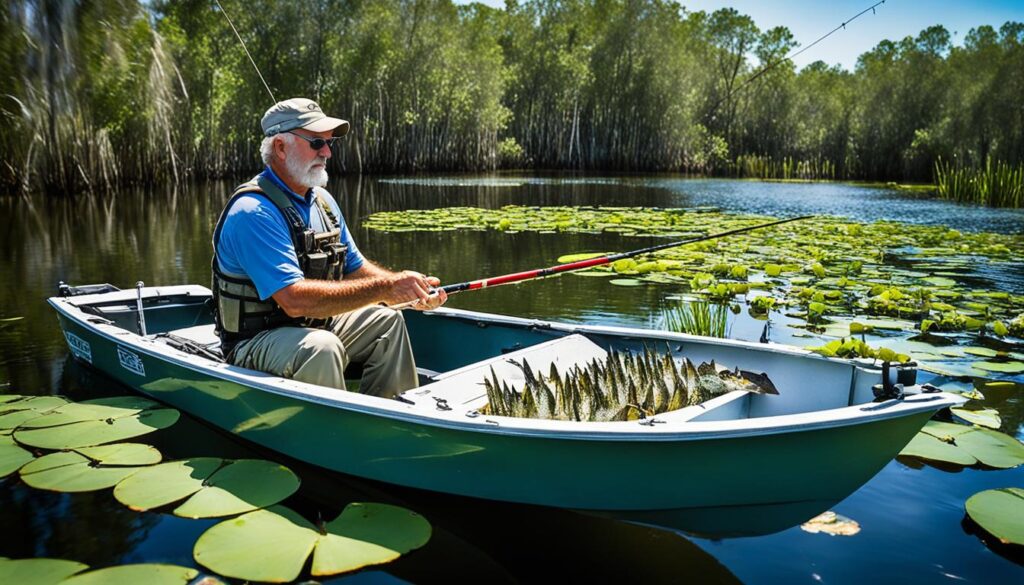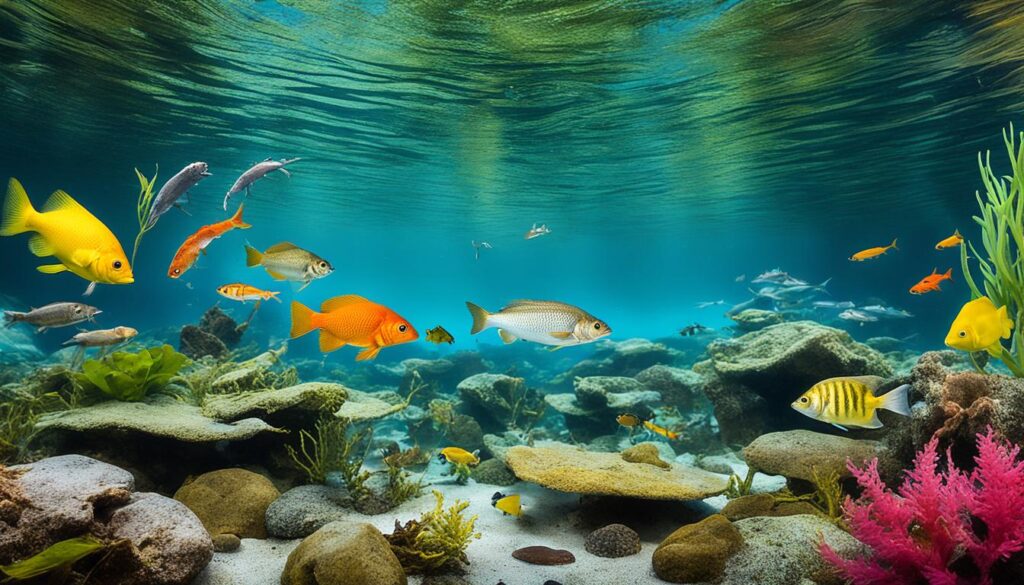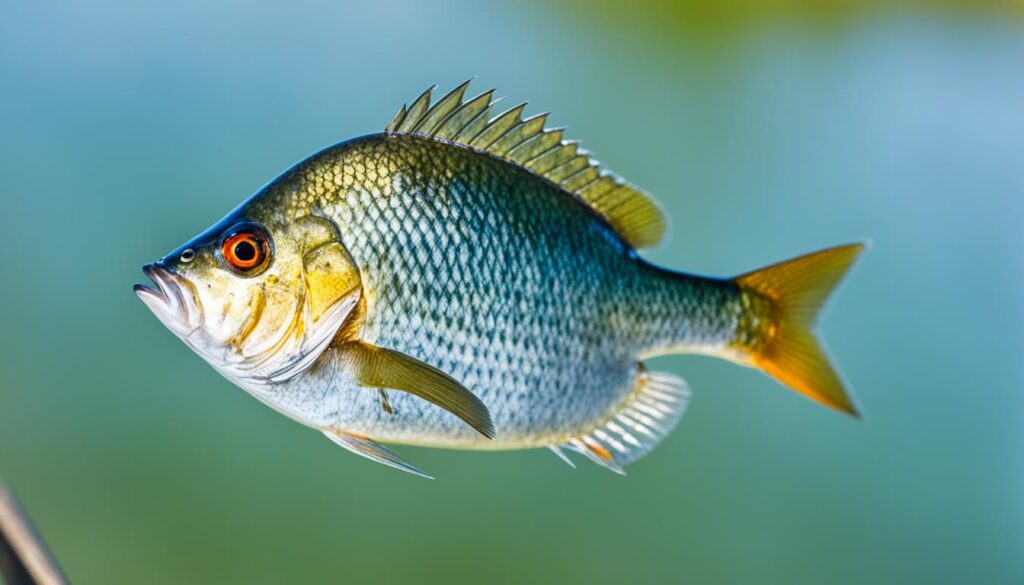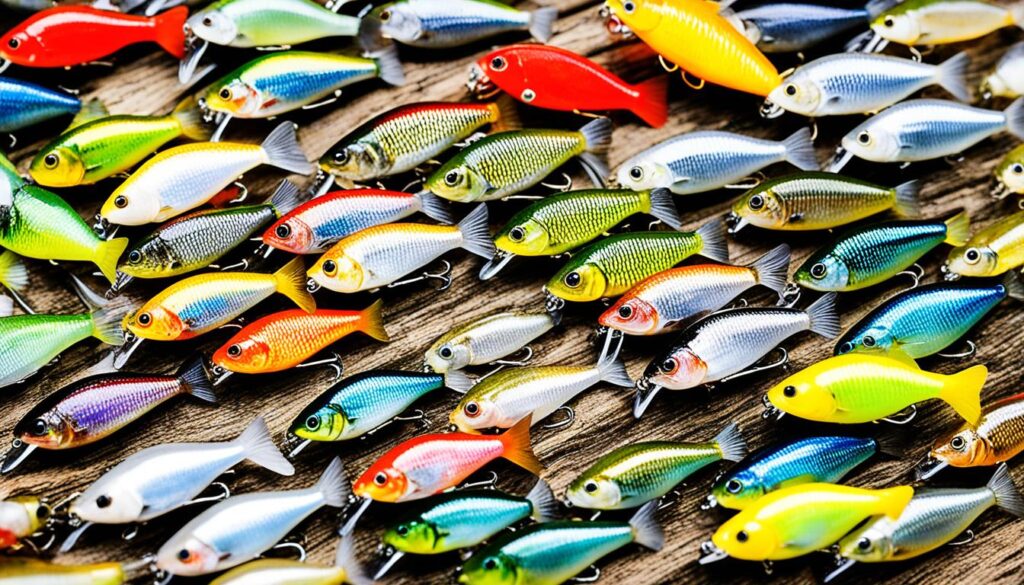What is the best live bait for bass fishing in Florida? Many anglers find that bluegill is an excellent choice. Florida Fish and Wildlife Conservation Commission (FWC) Rules and Regulations, you can use pickerel or panfish, such as bluegill, redear sunfish, and redbreast sunfish, as bait. However, there are essential rules to follow.
Critical Rules for Using Panfish as Bait
- Approved Methods: You can use these fish as bait, but not with trotlines or bush hooks. You are limited to using rod and reel or pole and line methods.
- Size Restrictions: If you want to use panfish shorter than 4 inches, they must come from a licensed fish farm.
Understanding FWC Regulations: The FWC has extensive fishing rules, including those for game, nonnative, and baitfish-catching methods. As a responsible angler, knowing and following these regulations is essential to ensure your fish legally and ethically in Florida.
Key Takeaways
- Anglers can use whole pickerel or panfish, such as bluegill, as bait for sport fishing in Florida.
- Whole pickerel, bream, or parts thereof cannot be used as bait for trotlines or bush hooks.
- Panfish less than 4 inches long and raised by a licensed aquaculture facility can be used as bait.
- The FWC has specific rules and regulations regarding the use of game fish, nonnative fish, and methods for taking baitfish.
- Anglers must familiarize themselves with Florida’s fishing regulations to ensure they fish legally and responsibly.
Introduction to Fishing in Florida
Florida stands out with its wide range of freshwater fishing options. It boasts many game fish like bass, crappie, and sunfish, as well as several non-game fish species. Anglers in Florida should keep up with the fishing regulations.
Overview of Freshwater Fishing in the State
The Florida Fish and wildlife conservation commission manages freshwater fishing. Florida’s waters are perfect for anglers with fish like bass and bream. This diversity makes Florida a top choice for those who love freshwater fishing.
Importance of Understanding Fishing Regulations
Knowing the fishing laws is vital. It helps anglers avoid trouble and keeps Florida’s waters healthy. By learning the rules from the FWC, anglers can enjoy fishing responsibly, protecting Florida’s aquatic life for the future.

What are Game Fish and Nongame Fish?
Knowing the difference between game and nongame fish is critical in Florida. It affects fishing rules and the type of fish you can use for bait.
Definition of Game Fish in Florida
The Florida Fish and Wildlife Conservation Commission (FWC) says game fish include black bass, crappie, bluegill, and more. These are top picks for anglers and have specific rules on size and catch.
Definition of Nongame Fish in Florida
Nongame fish include all nongame freshwater species, including catfish, shad, and many types of minnow in Florida. Knowing this helps anglers pick the right fish for bait.

Can i use bluegill as bait in florida
According to the FWC, you can use whole pickerel or panfish like bluegill in sportfishing. This includes redear sunfish, redbreast sunfish, and others. But you can’t use pickerel or bream as bait for specific methods.
Using bluegill as live bait and Florida rules on using panfish as bait help manage the state’s fisheries responsibly. Knowing the rules lets anglers enjoy fishing while protecting nature.

Rules for Using Fish as Bait
Black Bass and Peacock Bass Restrictions
- Black bass and peacock bass cannot be used as bait, protecting these species and maintaining ecological balance in Florida’s waters.
Nonnative Fish Species Restrictions
- Live nonnative fish are generally banned as bait, except for variable platys and fathead minnows. Goldfish and carp are prohibited to prevent harmful invasions and protect native ecosystems.
Regulations for Using Panfish as Bait
- Anglers can use whole pickerel or panfish (e.g., bluegill, redear sunfish) for sportfishing with a rod or pole.
- Panfish shorter than 4 inches must come from a licensed fish farm.
- Panfish cannot be used on trotlines or bush hooks.
Legal Methods for Taking Bait Fish
The Florida Wildlife Commission outlines several legal methods for collecting bait fish:
Cast Nets and Minnow Seines
- Cast Nets: Use nets with mesh no larger than 1 inch to catch small shrimp, golden shiners, and catfish up to 8 inches.
- Minnow Seines: These nets can be up to 20 feet long, 4 feet deep, and have 1-inch mesh.
Minnow Traps and Dip Nets
- Minnow Traps: Traps can be up to 24 inches long with a funnel opening no larger than 1 inch.
- Dip Nets: These nets can be up to 4 feet wide.
Following these methods ensures you collect bait fish legally and responsibly.
Licensing Requirements for Bait Fishing
Personal Use
- No special license is needed for collecting baitfish for personal use, such as bluegill or other panfish species.
- A regular sportfishing license covers your needs.
Commercial Use
- You must obtain a commercial fishing license from the FWC to sell baitfish. This ensures proper management of the baitfish industry and helps protect Florida’s fishing resources.
Understanding and adhering to these licensing requirements helps maintain healthy baitfish populations and avoid legal issues.
| Bait Fishing Activity | License Requirement |
|---|---|
| Collecting baitfish for personal use | Valid freshwater fishing license |
| Taking bait for commercial sale | Commercial fishing license |
Sustainable Angling Practices
Anglers play a significant role in ensuring Florida’s fisheries stay healthy for the future. The Florida Fish and Wildlife Conservation Commission (FWC) asks anglers to adopt practices that protect these resources.
Catch-and-Release Techniques
When you catch a fish you don’t plan to keep, how you handle and release it matters. It’s critical to avoid taking the fish out of the water and to touch it as little as possible. This will increase the fish’s chance of survival.
Minimizing Environmental Impact
Along with catching fish carefully, anglers should lessen their environmental effect. This means appropriately getting rid of any trash and not using harmful bait. By doing this, you’re helping to keep Florida’s waters and fisheries in good shape.
Penalties for Violating Fishing Regulations
The FWC is strict about fishing regulations. Those who break these rules face significant penalties for violating Florida fishing regulations. This could mean paying fines, losing the fish rights, or facing legal troubles.
Resources for Anglers
If you fish in Florida, you’re in luck. There are many resources to keep you up-to-date on fishing rules and tips. This guide will show you where to find helpful information.
Florida Fish and Wildlife Conservation Commission
The Florida Fish and Wildlife Conservation Commission (FWC) is a top help center for anglers. It provides rules, learning tools, and local office contacts. The FWC’s website has all the details on fishing in Florida, from rules to how to do it sustainably.
Local Fishing Clubs and Organizations
Besides the FWC, local fishing clubs and groups can be a treasure trove of knowledge for Florida’s anglers. These groups give tips on following fishing laws, teach fishing methods, and suggest equipment. They also plan events and trips to boost fishing the right way. Joining these clubs means you get lots of advice and support for your fishing adventures.
Conclusion
Using bluegill as bait in Florida is perfectly legal if you follow state fishing rules. The Florida Fish and Wildlife Conservation Commission (FWC) lets anglers use certain whole fish or their parts for bait.
It’s important to note that there are specific rules regarding using fish as bait in Florida. For instance, certain fish, such as pickerel or bream, are prohibited from certain bait methods. Additionally, specific fish species that are being used are not allowed. Familiarizing yourself with these rules ensures you fish within the legal and responsible boundaries.
Knowing and following FWC’s rules allows you to fish freely and help keep Florida’s water life healthy. Fishing in Florida can be great with the proper knowledge and care.
FAQ
Can I use bluegill as bait in Florida?
In Florida, you can use some fish as bait, according to the FWC. This includes whole or parts of pickerel, bluegill, and sunfish types. You’re allowed as long as you catch them yourself.
What are the rules and regulations regarding the use of fish as bait in Florida?
The FWC has set rules on using fish as bait in Florida. You can’t use black bass, peacock bass, or any part of them. Also, nonnative live fish, outside of variable platys and fathead minnows, and live goldfish and carp are off-limits for bait.
What are the legal methods for taking baitfish in Florida?
When it comes to baitfish in Florida, the FWC allows the use of specific methods. This includes collecting freshwater shrimp and small catfish for bait. Anglers can use cast nets, minnow dip nets, and seines of certain sizes. They can also use minnow traps that meet the defined measurements of the FWC.
Do I need a separate license to collect baitfish for personal use?
If you’re collecting baitfish for your use, a standard freshwater fishing license is all you need. The FWC confirms that no other special license is required for this purpose.
What are the penalties for violating fishing regulations in Florida?
Breaking fishing rules in Florida can have serious consequences. These include fines, losing your fishing license, or facing criminal charges. The FWC strictly enforces these rules.
